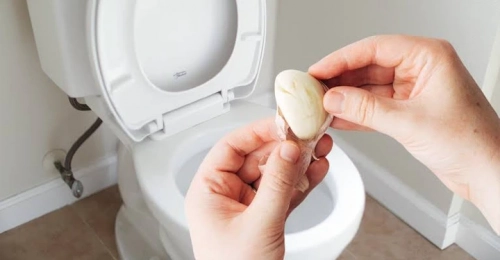Communications And EntertainmentHealth And LifestyleRelationship And MarriageNews And PoliticsReligion And PrinciplesStories And PoemsFood And KitchenFamily And HolidaysOthersGeneralHealthCelebritySports And FitnessFamilyPoliticsAnnouncementRelationshipsEntertainmentMarriageSecurityChildrenMotivationalsBusiness And MoneyPersonal Care And Beauty
profile/3045tmp.jpg
Timifrank

The Benefit Of Putting Garlic Inside Your Toilet
~1.5 mins read
Cleaning is an essential thing that you need to do daily in your environment. It is important that you carry out personal hygiene in different places inside your house, and most importantly the toilet. The toilet is a place that contains a lot of germs and bacteria. It needs to be kept clean at all times. According to a research, using a popular plant called garlic to clean the toilet, can help to keep it sanitised. Many people make use of chemicals to clean their toilet, but some people don't actually know that they can make use of garlic to clean their toilet.
Garlic can be used to clean the toilet because, it contains a substance called allicin, which can act as an antiseptic. This substance prevents the growth of dangerous microorganisms. This substance found in garlic can be used to keep the toilet clean, and free from bacteria.
How to use garlic to keep your toilet clean
To use garlic to keep your toilet clean, then you should follow these instructions:
1. Peel a clove of garlic and put it inside the toilet. You can do this at night before going to bed because, the toilet is not always used too much at night. If the toilet is used at night, then it is important that you repeat the process after each use.
Photo credit: stylecraze.com
2. When you wake up in the morning, then you should flush the toilet.
It is important to keep your toilet clean regularly, to avoid getting germs and bacteria into your body system.
Source: NewsyToday
Thanks for reading and don't forget to comment, share and follow for more information.
profile/3045tmp.jpg
Timifrank

Why You Should Be Aware Of The Suicide Disease And Its Symptoms
~1.8 mins read
What is Trigeminal neuralgia?

Trigeminal neuralgia is also known as " tic dulure" or " suicide disease" and is characterized by acute and intermittent pain in the face, jaw, and eyes. This condition affects the trigeminal nerve, the largest cranial nerve, and the sensory nerves of the head and face. It is also the motor nerve muscle needed for chewing. The nerves transmit impulses of contact, pain, pressure and temperature from the face, jaw, gums, forehead and around the eyes to the brain.
Trigeminal neuralgia is often considered one of the most painful conditions in medicine. Pain is usually localized on one side of the jaw or cheek, but some people may experience pain on both sides. The pain can last all day or weeks. It is more common in women than men and rarely affects people under the age of 50.

Causes
This occurs when blood vessels block the supply of nerves to the face via the trigeminal nerve. This occurs because the structure of the blood vessels changes slightly over time, and rubs against the trigeminal nerve. Constant friction with each heartbeat destroys the insulating membranes of the nerves and causes nerve irritation. In most cases, the blood vessel responsible is the superior cerebral artery, but in some cases it can be caused by veins.

Symptoms
This condition is characterized by a sudden, severe, or sharp electric shock that lasts for a few seconds and sometimes several minutes. Most of the pain is felt on the face but can be localized around the lips, eyes, nose, scalp and forehead. It can also cause someone' s hoarse voice.
Pain usually occurs when performing simple functions such as brushing your teeth, applying make- up, touching your face, swallowing, or speaking. Research shows that even a gentle breeze can make the situation worse.
Diagnosis
Trigeminal neuralgia is a condition that is usually diagnosed based on a patient' s description of the symptoms. There are a number of methods that can be used to rule out other causes of pain, including magnetic resonance imaging (MRI) or angioplasty. However, there is still no test to determine the presence of this condition.
Advertisement

Link socials
Matches
Loading...
